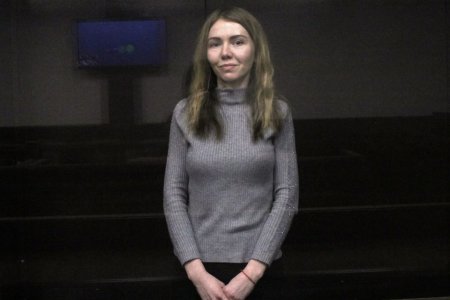
Ivan Sarancha was seven in 2014, when Luhansk fell under effective Russian control, with all of his schooling in the Russian proxy ‘Luhansk people’s republic’ [‘LPR’]. He is, in short, one of the first of a generation whom Russia has sought to brainwash into seeing themselves as ‘Russian patriots’. While there remains every reason for concern about Russia’s aggressive indoctrination and militarization of children on occupied territory, Ivan provides a cheering example of Russia’s failure. Two months after the young man, aged just 18, managed to flee to government-controlled Ukraine, he has given a moving interview to Andriy Dikhtarenko from Realna Gazeta. He did so, moreover, in Ukrainian, which he first learned by communicating on the Internet with friends from Dnipro.
It was Russia’s full-scale invasion of Ukraine, Ivan says, that made him fully understand that he was “for Ukraine”. It was then that he began planning to leave occupied Luhansk, and soon afterwards that he and his friends from Dnipro began communicating only in Ukrainian. The plans would have needed to be kept very secret as Ivan explains that his parents held pro-Russian views even before 2014 and have not changed them.
It is important to note that Ivan confirms that information about Russia’s bombing of Mariupol, about the atrocities at Bucha did reach people in Luhansk. Ivan’s parents, however, were clearly unwilling to believe them, and repeated the Russian claims that the videos were fakes. Ivan suggests that he was simply less “attached to Russia”. He could compare what he heard from Russian sources with information from Ukrainian and western media and, on the basis of the facts, despite who was right, and who not.
Dikhtarenko, who left Luhansk in 2014, asked Ivan what he lacked in Luhansk.
“I lacked Ukraine. Especially after 24 February 2022 when I understood my position once and for all, that I was for Ukraine. There was also a lack of freedom”. Asked to elaborate on the freedom available in (government-controlled) Ukraine, but not in Luhansk, Ivan pointed out that he could go out into the street now and criticize the present Ukrainian authorities. If he tried something like that in occupied Luhansk, he says, the consequences would be serious.
He is hoping to study in Kyiv at the National Academy of Fine Arts and Architecture and to become a sculptor. Asked what he anticipates from life in Kyiv, he says that it will be freer, that he will be able, without any obstruction, to speak Ukrainian, that he would be able to travel abroad and meet different people.
Since there is no longer even the old humanitarian corridor between Russia and Ukraine, Ivan had to get to government-occupied Ukraine via Russia (Rostov, Moscow) and then Belarus. In response to Ivan’s mention of travel abroad, Dikhtarenko points out that this is no easy task right now because of the war. Had Ivan not considered trying to get to another country from Belarus?
Ivan was quite categorical: “I don’t want to stay anywhere except Ukraine. I set off with the aim of returning to my Homeland, to my Ukraine.”
This was a huge step for a young lad, and one that he was forced to take alone, as there was no way he could tell his parents what he was planning. The journey took 3-4 days, with Ivan clearly in a state of immense stress until he was safely in Ukraine. He was, fortunately, able to first get to his friends, and in fact meet them for the first time in person, but is now living in Kyiv, and doing studies externally in order to obtain a Ukrainian matriculation certificate.
His parents reacted very negatively to the news that he was in government-controlled Ukraine, and he is now only in any contact with his mother.
Considering how much the aggressor state has prioritized indoctrination of children and teenagers, it is interesting that Ivan says young people in ‘LPR’ are more likely to be for Ukraine than “adults”. Disturbingly, he estimates that only 10-15% of the population of Luhansk have a pro-Ukrainian position, although he does note that most people identify with their region, and don’t really see themselves as either Ukrainian, or Russian.
He was the same, he says, until the full-scale invasion. “When I saw the battles for Mariupol, I began to analyse everything and fully understood that I am a Ukrainian.
As far as I know, at present there is a tendency that teenagers are more likely to use Ukrainian and western media and compare that with what is said in Russian media. They understand that what they’re told is untrue.”
This is, of course, why Russia tries so hard to block any Ukrainian and western media and to stop people from using VPNs. Children and young people are likely to have their phones checked at school, or even on the street, with it positively dangerous to be found with Ukrainian apps, media sites, etc.
The Media Initiative for Human Rights have documented 196 cases where civilians have been abducted, including 27 women. The real number is, unfortunately, likely to be much higher. Several very young Ukrainians from Luhansk oblast have been abducted, almost certainly tortured and sentenced to long terms of imprisonment (or are facing such sentences) for donations to Ukraine’s Armed Forces or charitable organizations.
See:
Artem Kudzhanov (and his father Ibragim Kudzhanov) Russians abduct and torture father and teenage son from occupied Luhansk oblast
Kateryna Korovina Forced 'to wake up a foreign citizen in her own country’. Kateryna Korovina sentenced to 10 years for opposing Russia’s occupation
Ivan Semykoz Russia sentences Ukrainian to 8.5 years for donation as a teenager to Ukraine’s Azov Regiment



